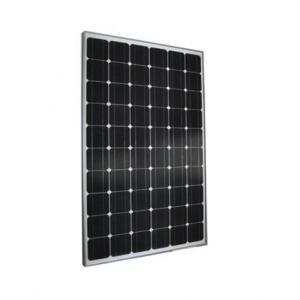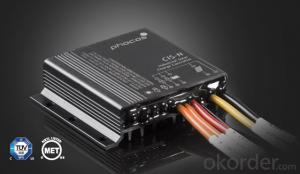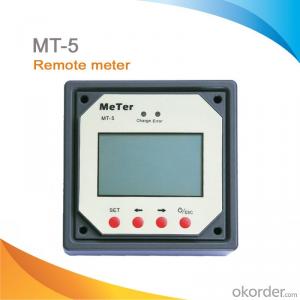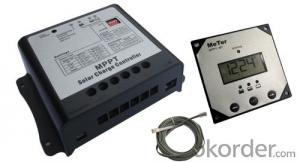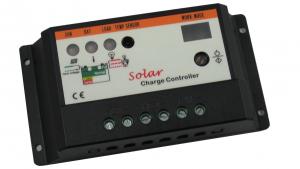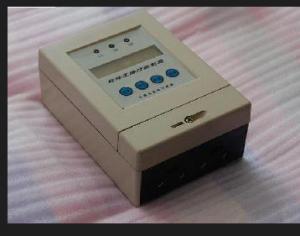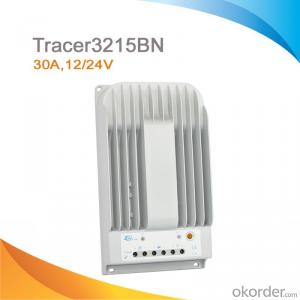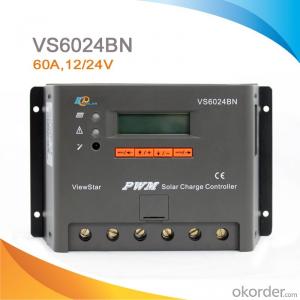200W Solar Inverter with Built-in Controller
- Loading Port:
- Shanghai
- Payment Terms:
- TT OR LC
- Min Order Qty:
- 10 unit
- Supply Capability:
- 50 unit/month
OKorder Service Pledge
OKorder Financial Service
You Might Also Like
1. Structure of 200W Solar Inverter with Built-in Controller
This Inverter with Built in Controller could uninterruptible charge the battery at day time with solar panel, adjust the charge current according to the voltage of battery to prolong life time of battery, float charging which could make battery always to be fully state for urgent power supply. Besides this product also have reverse current protection from battery to solar panel.
2. Main Features of 200W Solar Inverter with Built-in Controller
Battery Low Voltage Protection
DC Input Overvoltage Protection.
Overload Protection
Short Circuit Protection
Thermal Protection
Fault Indication Function
3. 200W Solar Inverter with Built-in Controller Images
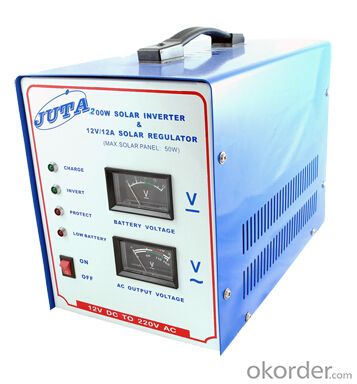
4. 200W Solar Inverter with Built-in Controller Specification
Max. current for solar power charging | 12A |
Max. USB output current | 600mA |
Max. DC socket output current | 2A |
Input voltage | DC10—14V |
Output power | ≤200W |
Input current | 0.5—25A |
No-load loss | ≤1.5% |
Output wave shape | Modified |
Output voltage | AC 205—230V |
Accumulator charging off voltage | 14V |
Accumulator supply off voltage | 10.2V |
Accumulator supply recovery voltage | 12.6V |
Output frequency | 50—60HZ |
5. FAQ
We have organized several common questions for our clients, which may help you sincerely:
1 ) How to guarantee the quality of the products?
The company presses the ISO9000 quality management system control product quantity strictly, the export production all passes the relevant national company check (CE, ROHS), and get high evaluation of the customer.
2 ) How long can we receive the product after signing Sales Confirmation?
Generally speaking, if there is enough quantity of finished products which can meet the clients’ requirement, we can manage the delivery within three to five working days according to the instruction of the payment terms in the Sales Confirmation; if the products need some time to get ready, we will arrange thedelivery as soon as possible after the manufacture.
- Q:Can a solar controller be used with different types of solar batteries?
- Yes, a solar controller can be used with different types of solar batteries as long as the voltage and charging parameters are compatible with the specific battery type. However, it is important to ensure that the controller is designed to support the specific chemistry and requirements of the battery to optimize its performance and lifespan.
- Q:What is the maximum load current for a solar controller?
- The maximum load current for a solar controller is the maximum amount of current that can be safely drawn from the controller to power the connected load. The specific value varies depending on the model and specifications of the solar controller, so it's important to refer to the manufacturer's documentation for the accurate maximum load current rating.
- Q:Can a solar controller be used with a generator?
- Yes, a solar controller can be used with a generator. The solar controller regulates the charging and discharging of batteries in a solar power system, and it can also be used to control the charging process when a generator is being used as a backup power source. By connecting the generator to the solar controller, it can intelligently manage the power flow and ensure that the batteries are charged efficiently and safely, regardless of whether the power is coming from solar panels or a generator.
- Q:Can a solar controller be used with a solar-powered residential building?
- Yes, a solar controller can be used with a solar-powered residential building. A solar controller is an essential component in a solar power system as it regulates the charging and discharging of batteries, manages power flow, and optimizes the performance of the solar panels. It ensures that the solar energy generated is efficiently stored and utilized, making it suitable for use in residential buildings powered by solar energy.
- Q:Can a solar controller be used with solar panels that are connected to a battery backup system?
- Yes, a solar controller can be used with solar panels that are connected to a battery backup system. A solar controller regulates the charging process of the battery by monitoring the voltage and current from the solar panels. It ensures that the battery is charged efficiently and protects it from overcharging. Therefore, it is an essential component in a solar panel system that is connected to a battery backup system.
- Q:How can I determine the size of solar controller I need for my system?
- To determine the size of the solar controller you need for your system, you should consider two main factors: the maximum current and voltage of your solar panels. First, calculate the maximum current your panels produce by dividing the wattage rating by the voltage rating. Then, choose a solar controller that can handle this maximum current and voltage. It's always recommended to select a controller with a slightly higher capacity to allow for potential future expansions or efficiency losses.
- Q:How does a solar controller handle fluctuating solar panel output?
- A solar controller handles fluctuating solar panel output by regulating the voltage and current levels to ensure a stable and consistent charge to the battery or load. It monitors the incoming solar power and adjusts the charging parameters accordingly to optimize the charging process and protect the battery from overcharging or undercharging.
- Q:Can a solar controller be used with solar-powered weather stations?
- Solar-powered weather stations can utilize a solar controller to regulate the charging and discharging of batteries in the solar power system. This device efficiently charges the batteries and safeguards them from overcharging or discharging. For solar-powered weather stations, the solar controller is commonly employed to effectively handle the power generated by the solar panels and charge the batteries that store surplus energy. This guarantees uninterrupted operation of the weather station during periods of low sunlight or at night without solar power generation. Through the use of a solar controller, the weather station can optimize power usage and prolong the battery lifespan by preventing overcharging or complete discharge. It also offers protection against electrical surges and other potential issues that may arise in a solar power system. In summary, a solar controller is a crucial component in managing and maintaining the power supply of solar-powered weather stations, ensuring their consistent operation and continuous data collection.
- Q:Are solar controllers necessary for small solar systems?
- Yes, solar controllers are necessary for small solar systems. They regulate the flow of electricity between the solar panels and the batteries, ensuring that the batteries are not overcharged or undercharged. Additionally, solar controllers help protect the batteries from damage caused by excessive voltage or current. Therefore, even for small solar systems, solar controllers are essential for efficient and safe operation.
- Q:What is the maximum current that a solar controller can handle?
- The maximum current that a solar controller can handle varies depending on the specific model and manufacturer. However, most solar controllers are designed to handle currents ranging from 10 to 60 amps. It is important to check the specifications of the particular solar controller you are using to determine its maximum current capacity.
1. Manufacturer Overview |
|
|---|---|
| Location | |
| Year Established | |
| Annual Output Value | |
| Main Markets | |
| Company Certifications | |
2. Manufacturer Certificates |
|
|---|---|
| a) Certification Name | |
| Range | |
| Reference | |
| Validity Period | |
3. Manufacturer Capability |
|
|---|---|
| a)Trade Capacity | |
| Nearest Port | |
| Export Percentage | |
| No.of Employees in Trade Department | |
| Language Spoken: | |
| b)Factory Information | |
| Factory Size: | |
| No. of Production Lines | |
| Contract Manufacturing | |
| Product Price Range | |
Send your message to us
200W Solar Inverter with Built-in Controller
- Loading Port:
- Shanghai
- Payment Terms:
- TT OR LC
- Min Order Qty:
- 10 unit
- Supply Capability:
- 50 unit/month
OKorder Service Pledge
OKorder Financial Service
Similar products
New products
Hot products
Hot Searches
Related keywords



